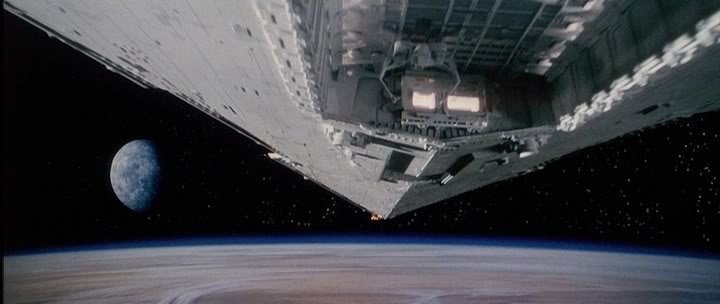The mega-blockbusters of 2015 are Spielberg/Lucas films, but without either Steven Spielberg or George Lucas at the helm. This is a rather depressing thought. There is a sense that Frankenstein's monster has finally destroyed even its own masters (though I doubt Spielberg is weeping too hard, having executive-produced the record-setting
Jurassic World, and if Lucas is - as some allege - disappointed with the direction the franchise took after selling it to Disney, there are plenty of honors and profits on hand to soothe him). For forty years, the awe-inspiring, intimidating beast of blockbuster cinema co-existed with individual filmmakers (and they were filmmakers first and foremost) who could reign it in, using the massive tentpole format to express personal visions. The Spielbergs, Lucases, and others like them were outnumbered by directors-for-hire, executing studio committees' visions of how best to market their property. But perhaps because of the idiosyncratic fact that these almost inhuman cinematic juggernauts were born out of the auteurist autonomy of New Hollywood, for a long time the art of personal expression was able to overlap with corporate desire to attract a mass audience. No longer...now Hollywood finally has what it always wanted: complete control over the major franchises, with skilled minions like JJ Abrams or Colin Treverrow to deal with rather than creators who insist on controlling their own product (not to mention taking a huge slice of the financial pie). Auteurism is dead...long live the corporation!
Wait, wait, no, that's not right. Let's try again.
The Force Awakens, the seventh episode of the
Star Wars saga (the first film in ten years, and the first sequel in thirty-two) is full of sweeping vistas and loving detail. Rey (Daisey Ridley) is a plucky new heroine, more Luke than Leia as she scavenges on her desert planet Jakku and discovers an ability to use the mystical Force. Teaming up with runaway stormtrooper Finn (John Boyega) and the lovably hilarious droid BB-8 - easily the most endearing new cast member - she makes her way across the galaxy in a stolen spaceship, the
Millennium Falcon, running into the ship's former owner, aging smuggler Han Solo (Harrison Ford), and his first mate Chewbacca (Peter Mayhew) along the way. At the forested way station of Maz Kanata (Lupita Nyong'o), Rey discovers the lightsaber of the legendary Luke Skywalker in a striking sequence mixing flashback and vision. The film's climax sees General Leia (Carrie Fisher) lead the Resistance (confusingly fighting
for the New Republic) battling the First Order, desperately trying to reinstate the Galactic Empire with the help of renegade Sith wannabe Kylo Ren (Adam Driver) and the Starkiller, a huge planet-turned-weapon-of-mass-destruction. The film is a lot of fun, hitting the nostalgic sweet spot by evoking old memories indirectly (Jakku obviously recalls Tattooine, yet it has its own barren, exotic flavor that somehow calls to mind Ralph McQuarrie's early concept art for the series) while also playing catch-up with old characters (when Han arrives, he essentially takes over the film for a while).
The Force Awakens also plays it extremely safe by - as everyone else has already noted - very closely mimicking the dramatic structure of the first
Star Wars film and resting so much of the film's appeal on familiar fan favorites like the
Falcon, Han, Leia, Chewie, X-wings, TIE Fighters, the
third incarnation of a Death Star, comic space-age banter, and the Empire vs. Rebellion power struggle (with the roles barely switched). This leaves the heavy lifting for the next episodes in the saga, leaving us with a sense of momentary satisfaction but also the larger question, "Why?"
There, was that better?
In truth, I find it almost impossible to discuss
The Force Awakens as an individual film without dipping into the larger phenomenon. This sequel finds itself on one of the most unusual missions in cinema history, and every frame is informed by that mission. However, I did want to divorce my larger Lucasfilm frustrations from the experience of watching the movie. As such, I can report that
The Force Awakens provided a good night out at the movies (and that, of course, the following write-up contains
spoilers). Abrams, Kasdan, et al have crafted an enjoyable work of entertainment, more satisfying than most big-screen spectacles I have seen in the past decade. And as a bonus, many moments capture a whiff of that old
Star Wars magic. Does it go deeper than that? Not really, and the ways in which it falls short and limits the experience are directly linked to the motivation behind the film and the context in which it was made. But first...why do I care?









